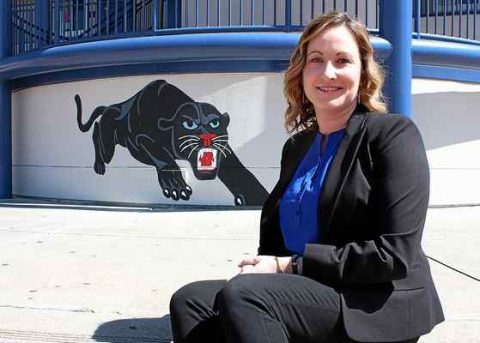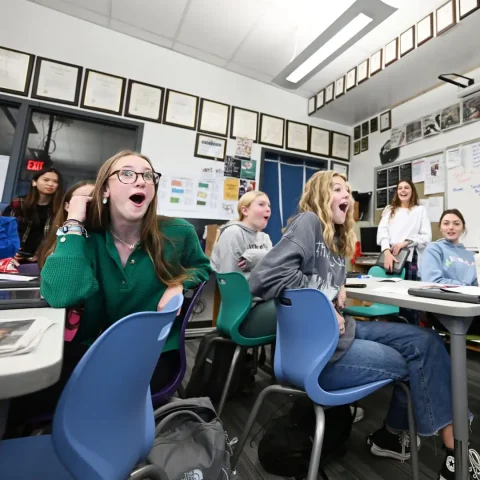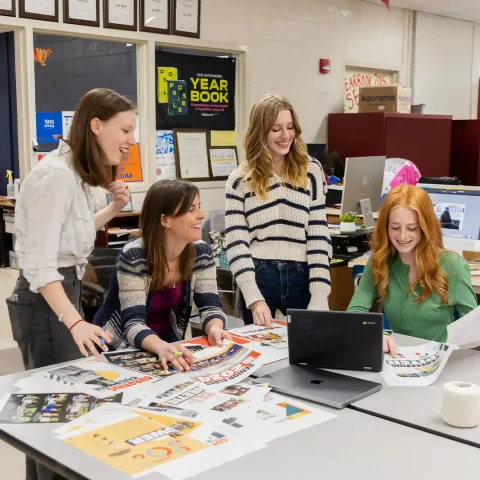Principal Brianna Kleinschmidt offers advice to administrators on how they can support their yearbook advisers. If you’re a first-year adviser, check out Kleinschmidt’s advice to you here.
It was a quick rise to the top for Brianna Kleinschmidt. She moved from yearbook adviser to principal in just a few years.
“I definitely didn’t set out or plan it that way,” she said.
Kleinschmidt is currently the principal at Benicia High School in Benicia, California. She started there as an English teacher, and was soon recruited to be yearbook adviser. She expected to remain in that role for a long time, but after two years her principal urged her to apply for an admin role. So she went for it.
“One of the things I really liked about yearbook was sort of being involved all over campus. And kind of having your hands in things, and knowing what was going on,” she explained. “And that was something I thought translated to the vice principal role.”
As an administrator with a thorough understanding of the yearbook adviser role, she can offer advice on how fellow administrators can encourage the adviser and keep the program successful. One of the most basic ways for administrators to aid and understand the yearbook is by visiting the classroom.
“Sit in with them and see what they’re doing. Just be available. I think sometimes a lot of yearbooks run so well that principals aren’t getting up in the room and making those connections with them.”
Administrators who have the time could offer to read over the copy, look at pages with them or sit down and talk about upcoming events.
“In the past, I think – from my experience – the principal’s role was very limited with yearbook. Where it was sort of just, ‘Hey, let me see the pages before you send them in so I can make sure I’m not going to get any phone calls about this.’ Whereas instead, I can help look at pages, and proof if needed, or give suggestions if they’re stuck with something, or give them a heads-up if there’s an event coming up.”
As the school year winds down, administrators can help yearbook advisers and staff plan for the next. While the staff is thinking about next year’s theme, administrators can inform them on what’s coming up.
“[Administration is] looking at the master schedule, new classes and what events might be happening next year.”
Administrators need to recognize that the yearbook calendar is different from the school year calendar. The class is different, too. Yearbook utilizes hands-on learning more than most classes. No matter how well a class project is designed, the project-based learning probably pales in comparison with yearbook.
Kleinschmidt recommends everyone work together to meet deadlines, from the administration on down. She knows how important this is: as a vice principal, Kleinschmidt spent February and March one year finishing the yearbook.
“They weren’t meeting their deadlines, and it became a really slippery slope of, ‘Oh, we’ll get caught up. Oh, it’s OK, we’ll get caught up.’ And no one was really making sure that they were getting caught up,” she said. “That was where I learned, yes, most advisers will make sure that they’re [on schedule]. But an administrator definitely needs to be checking in along the way also. Otherwise you find yourself in a really bad situation.”
It’s a delicate balance – students take a lot of pride and ownership over the yearbook, so she tries to make suggestions delicately and help without stepping on anyone’s toes.
Administrators can further support yearbook advisers and staff by learning about the process. Kleinschmidt suggests attending the JEA/NSPA National High School Journalism Convention in the fall or spring, or another yearbook conference if possible.





